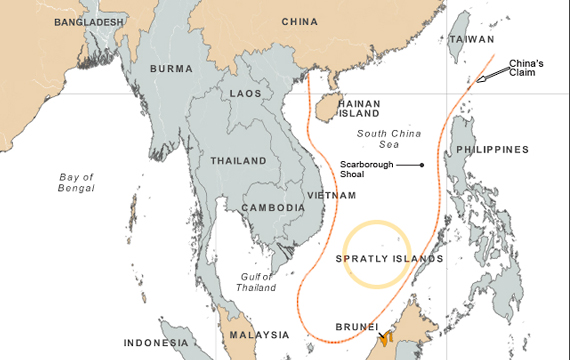
U.S. Secretary of State John Kerry addresses a meeting with students in Addis Ababa, Ethiopia May 26, during the 50th anniversary ceremonies for the African Union. Photo: AP
Chinese-Built Headquarters Towers Over African Union Summit
Kerry: U.S. Behind on Africa Investment, “We Need to Change That”
In the USA vs. China contest for influence in Africa, China was the clear winner at celebrations marking the 50th anniversary of the founding of the Organization of African Unity.
Chinese Vice Premier Wang Yang spoke to heads of state at the African Union’s bright new (Chinese-built) $200-million headquarters: “not only a new landmark in Addis Ababa but also the latest landmark in the long friendship between China and Africa,” declared China’s state-run Xinhua news agency.
Beneath the 20-story tower now topping the skyline of the Ethiopian capital, Wang entered the paneled conference hall to hearty applause, praising the alliance for political self-determination and for pushing forward Africa’s fight against imperialism, racism, and colonialism.
Kerry bumped from telecast
Hours later, across town in a rain-soaked, near-empty warehouse of a Millennium Hall, U.S. Secretary of State John Kerry’s speech was cut from the televised official program. With other speakers’ remarks running long, Kerry was bumped after Brazilian President Dilma Rouseff made headlines by writing off $900-million in African debt.
Given a few minutes off-camera during a late dinner at the Sheraton, Kerry spoke of working together on peace, security, trade, democracy, good governance, and human rights.
“The proverb tells us, ‘If you want to go quickly, go alone. But if you want to go far, go together,'” Kerry said. “In the coming days, Africa and the Americas will go farther than anyone could have imagined five decades ago. And I will tell you this: We are determined to do it together.”
But for Ethiopian Prime Minister Hailemariam Desalegn, going farther clearly means going with China.
“It is encouraging to note that some of our friends and partners have given priority to infrastructure development in Africa in terms of their strategy partnership with our continent,” he told the AU summit. “In this regard I wish to take this opportunity to express my deepest appreciation to China for investing billions to assist us in our development endeavors.”
China’s six-fold increase in trade
Where Kerry talked about hopes for an AIDS-free generation, Vice Premier Wang talked about the past decade’s six-fold increase in China-Africa trade to more than $120 billion — a difference not lost on the secretary of state.

China has been cultivating its relations with Africa. Here Chinese leaader Xi Jingping greets African Union chairperson Nkosazana Dlamini-Zuma in Beijing last February 13. Photo: AP
“China and Brazil have frankly been investing more in Africa than we have. That has to change,” Kerry told students at Addis Ababa University. “But I’m concerned, though, that some of the involvement of some countries here is not as transparent as the United States is, and some of it can, in fact, undermine democracy depending on how it is done.”
Asked if he was talking about China, Kerry said: “I’m talking about some countries. And I think we need to be involved. We need to be thoughtful about how – what kind of standards are we living up to, because you don’t want to lose your sovereignty or lose opportunities depending on how that happens.”
Chinese officials at the AU summit responded by comparing commitment — contrasting President Xi Jinping’s visits to Tanzania, Congo, and South Africa during his first month in power with President Barack Obama’s 2009 day in Ghana and his approaching first extensive trip to Tanzania, South Africa, and Senegal in this, his fifth year in office.
Jennifer Cooke, Africa director for the Center for Strategic and International Studies, says those presidential stops are an opportunity to re-engage in Africa at a higher level than the Obama administration’s first term.
“It didn’t have the resources that the Bush administration did for big splashy initiatives like PEPFAR (Aids relief program) and the Millennium Challenge Account,” Cooke says. “It has tried to do things on food security, on expanding and integrating global health.”
A more active, private-sector approach to trade and investment “speaks to a much more aspirational, positive engagement with Africa rather than getting mired into the kind of intractable, difficult, complex conflicts like DRC and Sudan and the Sahel.”
“Those kinds of commercial investment relationships really are much more partnerships of equals for the United States not to be looking at Africa as conflict, disease, and hunger but also as a place where partnerships are possible,” Cooke says.
“There’s an opportunity to say, ‘Look, we’re back and we are prepared to engage at a different level, in different ways than we did in the past, but in a much more positive way.'”



























